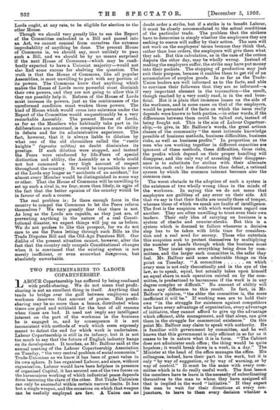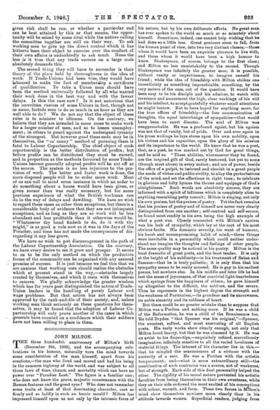TWO PRELIMINARIES TO LABOUR COPARTNERSHIP.
1 ABOUR Copartnership has suffered by being confused
with profit-sharing. We do not mean that profit- sharing is not an excellent thing in itself. Anything that tends to bridge over the gulf between employers and workmen deserves that amount of praise. But profit- sharing may be no more than a bonus, distributed when times are good and withheld for the best of all reasons when times are bad. It need not imply any intelligent interest on the part of the workman in the business he is engaged in, and by consequence it is not inconsistent with methods of work which seem expressly meant to defeat the end for which work is undertaken. Labour Copartnership is still in its infancy, but it is not too much to say that the future of English industry hangs on its development. It touches, as Mr. Balfour said at the annual meeting of the Labour Copartnership Association on Tuesday, "the very central problem of social economics." Trade-Unionism as we know it has been of great value in its own sphere. It has organised Labour, and since, without ors;anisation, Labour would have been helpless in presence of organised Capital, it has secured one of the two forces on the harmonious working of which industrial peace depends from becoming the slave of the other. But Trade-Unionism can only be successful within certain narrow limits. It has but a single weapon, and the occasions on which that weapon can be usefully employed are few. A Union can no doubt order a strike, but if a strike is to benefit Labour, it must be closely accommodated to the actual conditions of the particular trade. The problem that the strikers have to determine is simply whether the employers they are seeking to coerce will suffer by their action. The men will not work on the employers' terms because they think that, rather than lose orders, the employers will give them what they ask. But this calculation, as in the case of the cotton dispute the other day, may be wholly wrong. Instead of making the employers suffer, the strike may have put money into their pockets. The stopping of production may just suit their purpose, because it enables them to get rid of an accumulation of surplus goods. In so far as the Trade- Union leaders are well informed as to the facts, and able to convince their followers that they are so informed—a very important element in the transaction—the result, though reached by a very costly road, is in the end bene- ficial. But it is plain that immense losses on the side of the workmen, and in some cases on that of the employers, would be prevented if the facts on which the issue really depends were known to both parties,—in other words, if the differences between them could be talked out, instead of being fought out. This is the aim of Labour Copartner- ship,—to give, in Mr. Balfour's words, the great artisan classes of the community "the most intimate knowledge possible of business methods, business difficulties, business risks, as well as business profits." In proportion as the men who are working together in different capacities are ignorant of these methods, these difficulties, these risks, the profits which depend on their proper handling will disappear, and the only way of arresting their disappear- ance is to substitute for strikes with their alternate victories, each only less disastrous than defeat, a rational system by which the common interest becomes also the common care.
The worst obstacle to the adoption of such a system is the existence of two wholly wrong ideas in the minds of the workmen. In saying this we do not mean that employers are guiltless of any error on their side. All that we say is that their faults are usually those of temper, whereas those of which we speak are faults of intelligence. The first is the suspicion with which workmen regard one another. They are often unwilling to trust even their own leaders. Their only idea of carrying on business is a system of checks and counter-checks. But this is a system which is doomed to failure whenever a decisive step has to be taken with little time for considera- tion and a real need for secrecy. Those who entertain this suspicion seek to protect themselves by multiplying the number of hands through which the business must pass. They insist upon everything being done by com- mittees, and the larger each committee is, the safer they feel. Mr. Balfour said some admirable things on this point on Tuesday. "A committee on which every man is not only theoretically and in the eye of the law, so to speak, equal, but actually takes upon himself an equal share in each operation carried on by the com- mittee, is predestined to barrenness if the work is in any degree complex or difficult." No amount of ability will make any difference to this result. In fact, in Mr. Balfour's opinion, "the abler the committee is, the more inefficient it will be." If working men are to hold their own "in the struggle for existence against competitors who have every advantage of organisation, every advantage of initiative, they cannot afford to give up the advantage which efficient, able management, and that alone, can give them in the struggle for commercial existence." On this point Mr. Balfour may claim to speak with authority. He is familiar with government by committee, and he well knows that this government is only efficient in so far as it ceases to be in nature what it is in form. "The Cabinet does not administer each office ; the thing would be quite hopeless; it would break down in a week, in a day." The Minister at the head of the office manages the office. His• colleagues, indeed, have their part in the work, but it is only "by way of suggestion, or by way of warning, or by way of control." it must be the same with every com- mittee which is to do really useful work. The first lesson the members have to learn is the necessity of subordinating themselves to the man to whom they have assigned all that is implied in the word "initiative." If they expect the men to wait for their directions at every con- juncture, to leave to them every decision whether a.
given risk shall be run, or whether a particular end can be best attained by this or that means, the oppor- tunity will be seized by some rival while the notices calling the committee together are still on their way. To ask working men to give up the direct control which it has hitherto been their object to exercise over the conduct of their own affairs is undoubtedly to ask much. None the less is it true that any trade success ou a large scale absolutely demands this.
The second thing they will have to surrender is their theory of the place held by thoroughness in the idea of work. If Trade-Unions had been wise, they would have laboured to make the fact of membership a certificate of qualification. To take a Union man should have been the method universally followed by all who wanted their work done in the best way and with the fewest delays. Is this the case now ? Is it not notorious that the unwritten custom of some -Unions in fact, though not in name, forbids men to do as much in an hour as they are well able to do ? We do not say that the object of these rules is to minister to idleness. On the contrary, we believe that they are intended in some cases to make work for a larger number of men, and so to lessen unemploy- ment; in others to guard against the undesigned tyranny of the strongest. But however good these ends may be in themselves, the "ca' canny" method of pursuing them is fatal to Labour Copartnership. The chief object of such copartnership is the better distribution of profits; but before profits can be distributed they must be . earned, and in proportion as the methods favoured by some Trade- Unions become generally adopted profits will be cut off at the source. The system is no less injurious to the pro- vision of work. The better and faster work is done, the more disposed people will be to order more work. Most of us can call to mind some instance in which an order to do something about a house would have been given, or given sooner than was really necessary, but for some previous experience of what the British workman can do in the way of delays and dawdling. We have no wish to regard these cases as other than exceptions, but there is a considerable body of evidence that they are not infrequent exceptions, and as long as they are so work will be less abundant and less profitable than it otherwise would be. "Whatsoever thy baud findeth to do, do it with thy might," is as good a rule now as it was in the days of the Preacher, and time has not made the consequences of dis- regarding it any less grave.
We have no wish to put discouragement in the path of the Labour Copartnership Association. On the contrary, we have every desire to see it grow and prosper. It seems to us to be the only method on which the productive forces of the community can be organised with any assured promise of success. It is just because we feel this that we are anxious that working men should realise the obstacles which at present stand in the way,—obstacles largely created by themselves, and which it rests with themselves to remove. We gladly acknowledge the greater wisdom which has for years past distinguished the action of Trade- -Union leaders in the handling of purely Labour and wage problems. But that action has not always been approved by the rank-and-file of their society, and, unless working men think seriously on these questions for them- selves, it may be found that the adoption of Labour Co- partnership will only prove another of the cases in which generals have counted on a confidence which their soldiers have not been willing to place in them.







































































 Previous page
Previous page